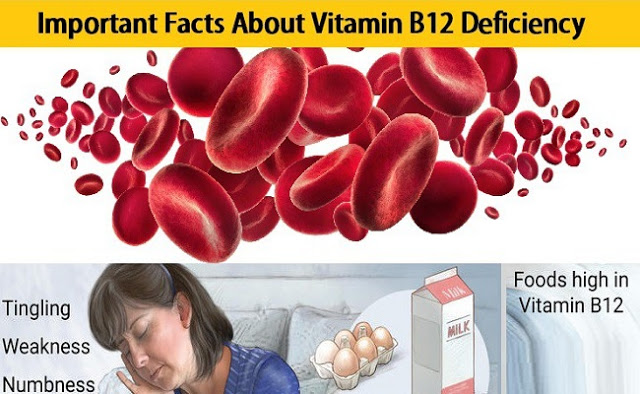Although mineral deficiencies are a lot more common, you have to learn how to recognize the symptoms of vitamin deficiencies. In this article we will bring you closer to the importance of vitamin B12.
But, first, here are some of the symptoms that indicate a severe lack of vitamin B12:
Light-headedness, tiredness, general fatigue
Shortness of breath, rapid heartbeat
Poor concentration and memory
Tingling and numbness in limbs
Issues with coordination and balance
Pale skin
Sore tongue
Bleeding gums and bruising
Upset stomach
Uncontrollable weight loss
Hallucinations, depression, mania and irritability
If you notice any of these symptoms, you are likely to lack vitamin B12.
The Importance of Vitamin B12
It is essential for your blood cells and nerves. This vitamin participates in the creation of the genetic material in our cells. Optimal levels of vitamin B12 protect against megaloblastic anemia. It is the type of anemia that makes you weak and tired.
Proper absorption of vitamin B12 requires two essential steps. In the first phase, the hydrochloric acid isolates the vitamin from the proteins in the food you have eaten.
Then, it binds to the intrinsic factor, a protein that is naturally produced in the stomach. Eventually, vitamin B12 is absorbed in the system. People diagnosed with pernicious anemia do not have the intrinsic factor, which means their body cannot absorb vitamin B12.
How Does Vitamin B12 Deficiency Occur?
It usually affects people over 60. Unfortunately, the low limit of the tests for vitamin B12 deficiency is pretty high, and most people are not even aware that they lack this vitamin.
Increase Your Vitamin B12 Intake
You can get it from your food, although some people fail to absorb it properly. Test your vitamin B12 levels to determine whether you are deficient.
Here are the groups of people that usually deal with such vitamin B12 deficiency:
Some people over 50 fail to absorb vitamin B12 from the food they eat, usually because they have low amounts of hydrochloric acids in their stomach. As we already said, this acid is essential for the absorption of the mighty vitamin.
Patients with pernicious anemia cannot absorb sufficient amounts of vitamin B12, because their bodies lack the intrinsic factor. High oral applications of this vitamin and vitamin B12 injections are some of the solutions to this problem.
Individuals who deal with digestive problems, like Crohn’s disease or Celiac disease, or patients who have experienced gastrointestinal surgery (weight loss surgeries) are unable to absorb vitamin B12 properly.
Vegans and vegetarians usually lack this vitamin, because animal products are the only source of this vitamin. Babies of vegan or vegetarian moms can also lack vitamin B12.
The Greatest Food Sources of Vitamin B12
Vitamin B12 is naturally found in animal products. It is sometimes added to fortified food products. Keep in mind that only fortified plant food products contain vitamin B12. Here are the best sources of vitamin B12:
Clams and beef liver
Eggs, poultry, meat, fish, milk, and dairy products
Nutritional yeast, certain cereals, and some fortified foods
How to Determine Whether You Lack Vitamin B12?
Anemia accompanied with high mean corpuscular volume
Problems with balance and walking, numbness, tingling, and various neurological symptoms
Disorientation, confusion, and altered mental status
Alzheimer’s disease and dementia
Schizophrenia, mania, and bipolar disorder
Pancreatic insufficiency and similar disorders of the gastrointestinal tract
Gastric bypass
People over 60
Restricted diet regimens (vegan and vegetarian diet)
Autoimmune disorders
Children with autism and delayed development
Babies of mothers who lack vitamin B12
Eating disorders
Family history of anemia
Metformin and PPI drugs
Cardiovascular disorders, such as blood clotting, stroke and heart attack
Treat Your Deficiency
Vitamin B12 is not toxic, and it is water-soluble, which means it is super easy to treat this deficiency. Consider high oral applications of this vitamin and take vitamin B12 injections to solve your problem. There are several forms of vitamin B12, and ask your doctor what fits you best.
Dairy products, meat, eggs, poultry, seafood and fish are some of the richest sources of vitamin B12. Eat more of these foods to treat your deficiency.
If you cannot eat animal products, carefully check the food labels, and take multivitamins to get the proper amount of vitamin B12.
